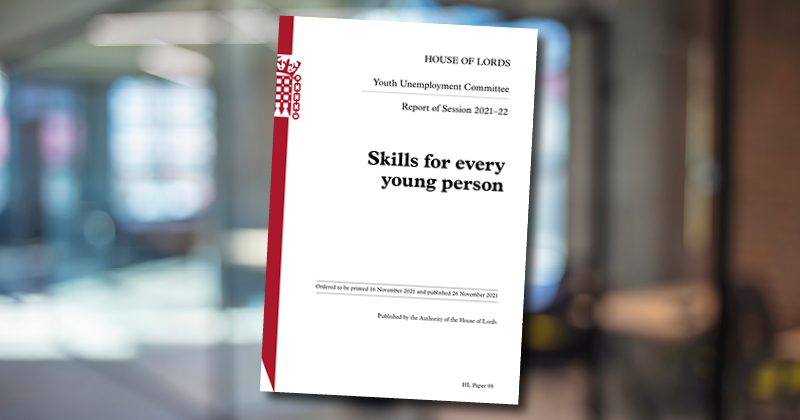Employers should be forced to spend two-thirds of their apprenticeship levy funds on young people at the lower levels, according to a House of Lords committee.
The House of Lords Youth Unemployment Committee also recommends, in a new report called Skills for Every Young Person, scrapping public funding for degree apprenticeships to ensure the levy system does not go bust.
This comes as further and higher education minister Michelle Donelan told university bosses in a speech this week to set “ambitious, measurable targets to significantly increase” degree apprenticeships.
The chair of the cross-party committee, Liberal Democrat peer John Shipley, told FE Week the government “should not be prior prioritising degree apprenticeships over young people getting on to the apprenticeship ladder at a lower level”.

While he does not find the “binary” choice between supporting either degree or lower level apprenticeships “helpful”, Shipley called it “a question of prioritisation”.
The committee counts former chancellor of the exchequer Ken Clarke and education secretary turned UTC founder Kenneth Baker among its members.
With 21.8 per cent of 18-year-olds not in education, work or training as of the second quarter of 2021, the report calls for the government to make employers spend at least two-thirds of apprenticeship levy funding on people who begin courses at levels 2 or 3 before the age of 25.
“What we’re trying to get at is that there are large numbers of young people who are leaving school, who are not getting career development with the skills they need, and the country needs,” says Shipley.
Apprenticeship levy could be overspent without changes, says Shipley
A maximum salary ceiling should also be introduced for levy-funded apprenticeships, today’s report recommends, an idea previously floated by the former skills minister Anne Milton.
For years, there have been warnings from the likes of the National Audit Office and the Department for Education itself that the apprenticeship budget could be overspent.
The NAO reported in 2019 on the “clear risk” the apprenticeship programme was not financially sustainable, after the average cost of training hit double the sum the government predicted in 2015.
Asked whether the committee fears that without their measures the apprenticeship system could go bust, Shipley said: “Well, the funding system isn’t working well. So the answer to your question is yes.
“Clearly, reform is going to be needed,” and this would have to be decided by government and employers as: “The apprenticeship system is terribly important for young people and social mobility.”
Government ‘cannot ignore the harm’ levy is doing to young people
The 389-report, based on evidence from sector experts, providers, employers and officials, also recommends lowering the threshold for paying the apprenticeship levy, so some small-to-medium enterprises would contribute.
The committee did not say what the threshold for the levy, currently paid by employers with a £3 million payroll, should be lowered to.
Founder of think tank EDSK Tom Richmond said the government “cannot continue the ignore” the harm the “well-intentioned” levy is doing to young people.
The government’s employer-led apprenticeship system “should not come at the expense of ensuring there is enough funding available” for training “aimed specifically at younger people”, he added.
He called the report’s proposal for a maximum salary for levy-funded apprenticeships “a novel way of ensuring young people looking to get started in their chosen career are prioritised in future”.
‘Employers shouldn’t pay for school failures’
University Vocational Awards Council chief executive Mandy Crawford-Lee said the report’s recommendations “drive a coach and horses through the social mobility agenda”.
While the proposals are “well intended as a response to the pandemic, it runs counter to the policy imperative to level-up access to higher education”.
Donelan’s announcement this week “highlighted the need to move away from the idea higher education was primarily for 18-to-24-years-old,” which Crawford-Lee “strongly welcomed”.

“Put bluntly, employers shouldn’t be forced to pay for the failure of the schools system. If an employer believes spending on a level 7 senior leader apprenticeship will have a greater impact on productivity than spending on 16-to-18-year-old apprentices, not only should they do so, but the apprenticeship system should support their decision.”
A Department for Education spokesperson said the government has “committed to improving the working of the levy” and defended level 6 and degree apprenticeships, saying they give employers “the opportunity to strengthen the skills of their workforce and allow people of all ages and backgrounds the chance to earn while they learn”.
The spokesperson also pointed out the department has taken action in the past when they deem there to be an inappropriate use of levy funds.
“We’ve already decided to not fund the MBA part of the highly popular level 7 senior leader apprenticeship, or to fund any level 8 [PHD level] apprenticeships, as we do not believe this represents good value for money,” they said.

















Your thoughts